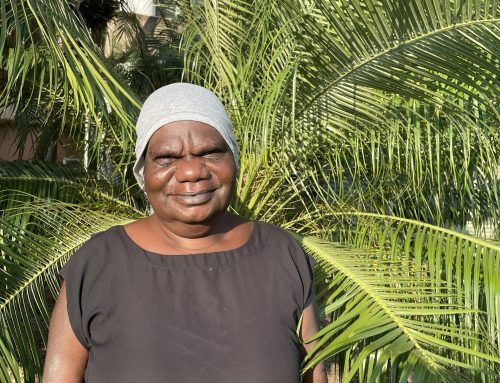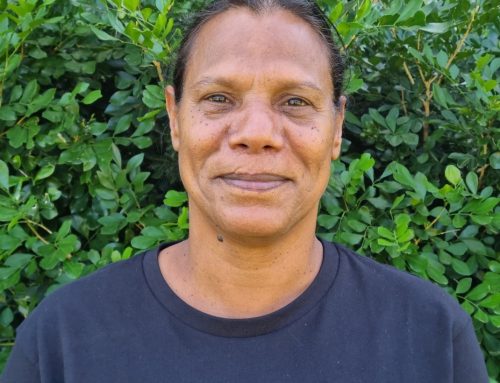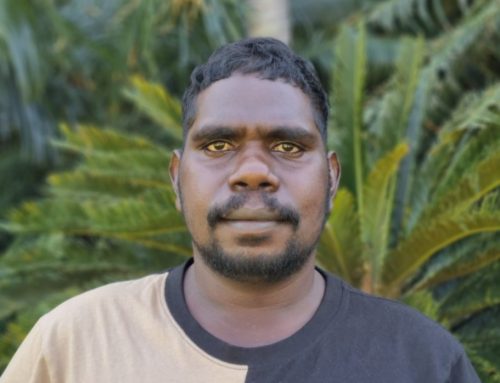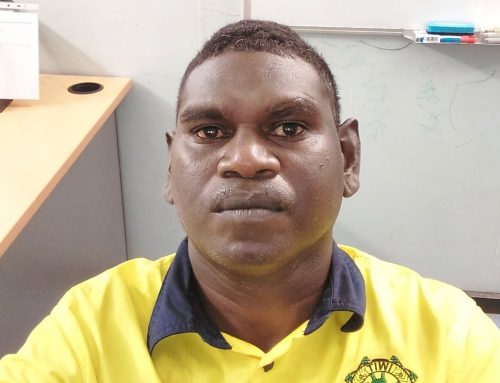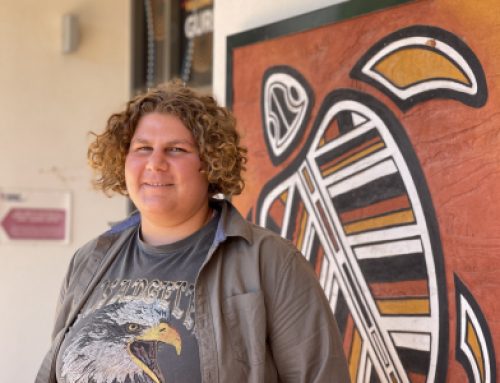Darwin and Galiwin’ku, NT
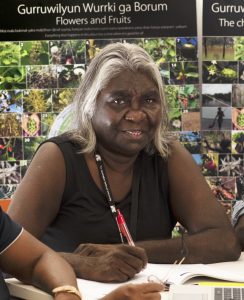 Joy Bulkanhawuy
Joy Bulkanhawuy
Researcher and Senior Lecturer in Aboriginal Studies
Bulkanhawuy works closely with Northern Institute researchers as well as Yolŋu teachers providing guidance, cultural authority and education.
Ŋarra yäku Joy Bulkanhawuy ga ŋarra Djambarrpuyŋu yolŋu miyalk. Ŋarraku wäwa’mirriŋu ŋunhi ŋayi leadership ŋayathaŋala linyalaŋgalaŋaw bäpa’mirriŋuw, ŋayi ga rom djämamirri. Ŋayi ŋarraku wäwa’mirriŋuy märraŋal djäma linyalaŋgal bäpa’mirriŋuwal ŋunhi Djirrikay. Djirrikaydja dhuwal nhe dhu märram bukmak bäpurru Dhuwakunḏitjnha ga Ḏalkarra ŋunhi Yirritjay dhu märram. Djirrkaynydja ŋayi yolŋu balanya ŋayi marŋgithirr manikaygu, gamunuŋguw, Ŋärraw bukmakku ŋunhi ŋayi yothu yan marŋgthin bäpa’mirriŋuwal ga märiwal. Ŋayi märraŋal märi’wal Djirrikay.
My name is Joy Bulkanhawuy and I am a Djambarrpuyŋu1 woman. My brother is the one who held leadership for our father and clan. He performs the rom2. My brother received the authority from our father as a Djirrikay – Dhuwa3 ceremonial leader. The Dhuwa ceremonial leader will bring all Dhuwa clan-nations and also Ḏalkarra – Yirritja4 ceremonial leaders. The Dhuwa ceremonial leaders learn songlines, the designs of lands, sacred ceremonies and everything. My brother learned all from his father and mothers’ mother and her brothers when he was a child. He became a Dhuwa ceremonial leader from his mothers’ mother and her brothers.
I worked at a clinic in Galiwin’ku for 10 years as a professional Yolŋu health staff. Then I moved to Darwin and I worked at Aboriginal Interpreter Service as an interpreter, particularly in health services sector for four years, then started teaching Yolŋu knowledge and practice at Sanderson High School in Darwin for several years together with my close Yolŋu kin.
After almost 20 years of Yolŋu health professional experience, I began working with Aboriginal Resource and Development Services Inc. as a bilingual and bicultural health educator, and delivering community services for Yolŋu people in Darwin and east Arnhemland. As a professional Yolŋu health educator, I always work in two-ways; Yolŋu and Western biomedical health practices. In collaboration with researchers at Charles Darwin University and Menzies School of Health Research, and Yolŋu research professionals at Yalu Marŋgithinyaraw in Galiwin’ku, I have worked on projects such as in the discipline of disaster management, natural resource management and public health.
All of my educational backgrouds was built in Galiwin’ku, not only through health training, but also through learning and practising Yolŋu education, gamunuŋgu (the design of land) and manikay (songline). My father passed his knowledge to my brothers and now I am co-holding and looking after my father’s knowledge for Djambarrpuyŋu people in ceremony and everyday life. I do not sing as men do, but I perform my authorised knowledge through ceremonial crying called milkarri. Now I’m authorised to share my knowledges and professional skills as a Djambarrpuyŋu elder with others such as those who work in (non)government organisations, health professionals working at hopsital and also students being passionate about learning our Yolŋu culture and languages.
1 Name of clan-nation
2 Rom has multiple meanings as law, education, culture, custom, tradition, and behaviour.
3 One of the moiety. The opposite to Dhuwa is Yirritja.
4 One of the moiety. The opposite to Dhuwa is Dhuwa.
Media Stories:
- Caring for Yolŋu and ways of life during COVID 19 (Indigenous X, June 2020)
Presentations:
“From Cyclones to COVID-19: Disaster Management from a Yolŋu perspective”


